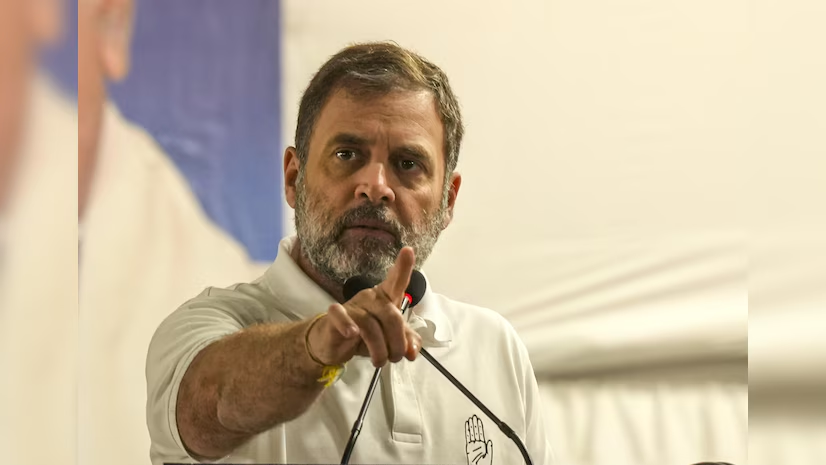Rahul Gandhi, the Leader of the Opposition, launched a strong critique of Prime Minister Narendra Modi’s government in the Lok Sabha on February 3, 2025. His speech addressed multiple key issues, including India’s economic policies, artificial intelligence (AI), electoral reforms, and national security. His statements sparked intense debates, drawing sharp responses from BJP leaders.
In this article, we break down the major points raised by Rahul Gandhi, the reactions from the ruling government, and the implications of his speech for India’s political landscape.
1. Rahul Gandhi on ‘Make in India’: A Failed Vision?
One of the most striking remarks made by Rahul Gandhi was regarding the ‘Make in India’ initiative. While acknowledging that the concept was promising, he criticized its execution. According to him, India’s manufacturing sector has declined rather than improved under this policy.
Key Facts Stated by Gandhi:
- Manufacturing’s share in India’s GDP fell from 15.3% in 2014 to 12.6% in 2025.
- This marks the lowest level of manufacturing output in the last 60 years.
- He conceded that Modi “tried” but ultimately “failed” to deliver on his promises regarding the initiative.
His remarks triggered an immediate reaction from BJP leaders, who argued that India’s manufacturing sector has seen steady growth and that global disruptions due to the pandemic played a role in slowing progress.
2. AI and Data Localisation: India’s Lagging Position
Rahul Gandhi also raised concerns about India’s position in the global AI race, emphasizing the importance of data. He stated that AI systems are dependent on vast amounts of data, and currently, China and the US dominate this sector.
His Key Points:
- China has at least a 10-year lead over India in AI development.
- The US controls consumer data, while China dominates production data.
- India lacks a strong AI infrastructure because of insufficient domestic data control.
His speech suggested that India’s policies on data governance and AI development are not competitive enough, potentially hindering future technological advancements.
3. Election Commission Reforms: A Question of Transparency?
Gandhi also took aim at the recent changes in the selection process of Election Commissioners. He pointed out that earlier, a committee comprising the Prime Minister, Leader of the Opposition, and Chief Justice of India was responsible for selecting Election Commissioners. However, the Chief Justice was removed from this process, giving the ruling party more control.
He expressed concerns that this change could undermine the neutrality of the Election Commission, particularly in the wake of the 2024 Lok Sabha elections.
In response, Assam Chief Minister Himanta Biswa Sarma accused Congress of hypocrisy, arguing that the party never introduced transparent election reforms during its long tenure in power.
4. China’s Presence in Indian Territory: A Strong Allegation
Rahul Gandhi made an explosive claim by quoting the Chief of Army Staff, asserting that “China is inside Indian territory.” According to him, China has occupied 4,000 sq km of Indian land, contradicting PM Modi’s previous statements on border security.
This claim led to an immediate response from the Lok Sabha Speaker, who asked Gandhi to provide concrete evidence. While opposition leaders backed his allegations, the ruling party dismissed them as misleading and politically motivated.
5. Rahul Gandhi on Unemployment: A Persistent Challenge
Gandhi acknowledged that India has witnessed economic growth but pointed out that the country has failed to address the unemployment crisis. He criticized both the UPA and NDA governments for not providing a concrete solution to joblessness.
His remarks on unemployment resonated with many young voters, who have frequently expressed concerns over job creation. However, BJP leaders countered his claims by citing India’s rising employment rates and increasing digital job opportunities.
6. Allegations on Maharashtra’s Voter Data Manipulation
Rahul Gandhi alleged that voter data in Maharashtra was manipulated, pointing out that nearly 70 lakh new voters were added between the Lok Sabha and Vidhan Sabha elections. He demanded transparency from the Election Commission, questioning how such a large number of voters were added within a short span.
This claim fueled concerns about potential electoral fraud, prompting demands for an independent review of voter registration data.
7. Criticism of BJP’s Ideological Stance
In his concluding remarks, Rahul Gandhi accused the Modi government of misrepresenting the values of national leaders like Sardar Patel, Dr. B.R. Ambedkar, and Jawaharlal Nehru. He suggested that while the government pays tribute to these figures, its policies contradict their core principles.
Political Reactions and Future Implications
Rahul Gandhi’s speech sparked an intense political debate, with BJP leaders dismissing his claims as politically motivated attacks. External Affairs Minister S. Jaishankar criticized his remarks on Trump’s inauguration invitation, clarifying that Indian PMs do not attend such events.
Meanwhile, Congress leaders rallied behind Gandhi, asserting that he raised legitimate concerns about governance, democracy, and national security.
Rahul Gandhi’s speech in the Lok Sabha was a bold attempt to challenge the Modi government on critical issues. While his allegations received pushback from BJP leaders, they have also fueled discussions on economic policies, electoral transparency, and India’s global positioning.
With the upcoming general elections drawing closer, this political confrontation is likely to intensify, shaping the narrative for both the ruling and opposition parties.
Also read – Rahul Gandhi Calls Arvind Kejriwal ‘Architect of Liquor Scam’



